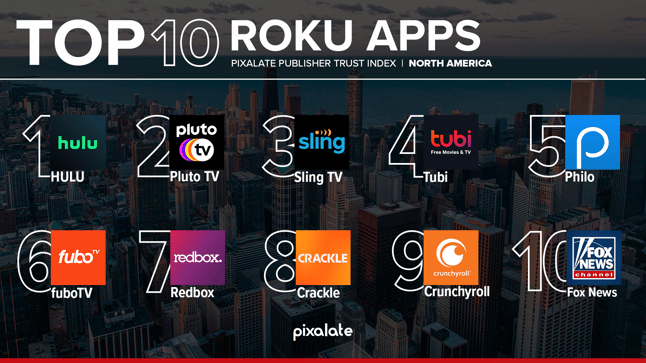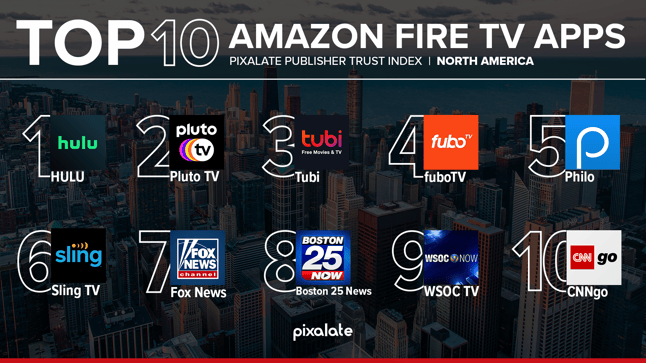


Hulu, owned by Disney (DIS), achieved the top spot of both Roku and Amazon Fire TV rankings of the Top Grossing CTV apps owned by public companies in the US. The estimated ad spend for the app reached $99M for Roku and $46M for Amazon Fire TV.
Advertisers appreciate the connection of popularity and quality offered by Hulu, as the app obtained the top spots in both CTV Publisher Trust Indexes for the best ad quality channels.
It is worth mentioning that Pluto TV, owned by ViacomCBS (VIAC), is a runner-up in both grossing rankings. The app’s estimated programmatic ad spend for Roku and Amazon Fire TV was $22M and $30M, respectively. The app also performed well in the Publisher Trust Index, gaining the top 5 spots in both classifications.
Philo, owned by a consortium of media companies, including Discovery (DISCA) and AMC Entertainment (AMC), reached the top 5 in both CTV grossing classifications. It is worth noting that most apps from the Top Grossing ranking are also present in the Publisher Trust Index, including Philo. It shows rising awareness of advertisers buying ads, not from the most popular but the most qualified sources.
Disclaimer
The content of this blog, and the Publisher Trust Indexes (collectively, the “Indexes”), reflect Pixalate’s opinions with respect to factors that Pixalate believes may be useful to the digital media industry. The Indexes examine programmatic advertising activity on mobile apps and Connected TV (CTV) apps (collectively, the “apps”). As cited in the Indexes and referenced in the Indexes’ key findings reproduced herein, the ratings and rankings in the Indexes are based on a number of metrics (e.g., “Brand Safety”) and Pixalate’s opinions regarding the relative performance of each app publisher with respect to the metrics. The data is derived from buy-side, predominantly open auction, programmatic advertising transactions, as measured by Pixalate. The Indexes examine global advertising activity across North America, EMEA, APAC, and LATAM, respectively, as well as programmatic advertising activity within discrete app categories. Any insights shared are grounded in Pixalate’s proprietary technology and analytics, which Pixalate is continuously evaluating and updating. Any references to outside sources in the Indexes and herein should not be construed as endorsements. Pixalate’s opinions are just that, opinions, which means that they are neither facts nor guarantees; and neither this press release nor the Indexes are intended to impugn the standing or reputation of any person, entity or app.
*By entering your email address and clicking Subscribe, you are agreeing to our Terms of Use and Privacy Policy.
These Stories on CTV
*By entering your email address and clicking Subscribe, you are agreeing to our Terms of Use and Privacy Policy.

Disclaimer: The content of this page reflects Pixalate’s opinions with respect to the factors that Pixalate believes can be useful to the digital media industry. Any proprietary data shared is grounded in Pixalate’s proprietary technology and analytics, which Pixalate is continuously evaluating and updating. Any references to outside sources should not be construed as endorsements. Pixalate’s opinions are just that - opinion, not facts or guarantees.
Per the MRC, “'Fraud' is not intended to represent fraud as defined in various laws, statutes and ordinances or as conventionally used in U.S. Court or other legal proceedings, but rather a custom definition strictly for advertising measurement purposes. Also per the MRC, “‘Invalid Traffic’ is defined generally as traffic that does not meet certain ad serving quality or completeness criteria, or otherwise does not represent legitimate ad traffic that should be included in measurement counts. Among the reasons why ad traffic may be deemed invalid is it is a result of non-human traffic (spiders, bots, etc.), or activity designed to produce fraudulent traffic.”

